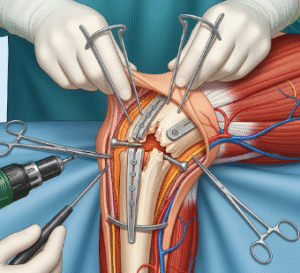Overview
Unstable Angina is a serious and potentially life-threatening condition characterized by sudden chest pain or discomfort due to reduced blood flow to the heart. Unlike stable angina, it occurs unpredictably—often at rest or with minimal exertion—and may not improve with medication. Unstable angina is a medical emergency and a warning sign of an impending heart attack (myocardial infarction).
What is Unstable Angina
Unstable Angina is a type of acute coronary syndrome (ACS) that results from sudden narrowing or blockage of a coronary artery, typically due to a ruptured atherosclerotic plaque or blood clot. This sudden restriction limits oxygen supply to the heart muscle, causing pain and increasing the risk of myocardial infarction. Unstable angina is classified as non-ST elevation ACS (NSTE-ACS) and requires immediate medical attention to prevent heart damage or death.
Symptoms
- Sudden chest pain or pressure, often described as squeezing, burning, or tightness
- Pain that occurs at rest or with minimal activity
- Chest discomfort that lasts longer than 15–20 minutes or recurs frequently
- Pain that radiates to the shoulders, arms, neck, jaw, or back
- Shortness of breath
- Sweating, nausea, or lightheadedness
- Anxiety or a sense of impending doom
Causes
Unstable angina is usually caused by a sudden disruption of blood flow in the coronary arteries, most commonly due to:
- Ruptured atherosclerotic plaque in the coronary artery
- Formation of a blood clot (thrombus) that partially blocks blood flow
- Coronary artery spasm (less common)
- Rapid narrowing of the arteries due to inflammation or plaque buildup
- Demand-supply mismatch in oxygen when coronary blood flow cannot meet the heart’s needs
Risk Factors
- Coronary artery disease (CAD) or a history of atherosclerosis
- Smoking
- High blood pressure (hypertension)
- High cholesterol (hyperlipidemia)
- Diabetes mellitus
- Obesity or sedentary lifestyle
- Family history of heart disease
- Older age (men over 45, women over 55)
- Stress or stimulant drug use (e.g., cocaine, amphetamines)
Complications
- Heart attack (myocardial infarction)
- Heart failure due to weakened heart muscle
- Life-threatening arrhythmias (abnormal heart rhythms)
- Sudden cardiac death
- Recurrent episodes of angina
- Reduced quality of life due to fear and limitations on physical activity
Prevention
Reducing the risk of unstable angina involves addressing modifiable risk factors and promoting cardiovascular health:
- Quit smoking and avoid exposure to secondhand smoke
- Manage blood pressure and cholesterol through diet, exercise, and medication
- Control diabetes with appropriate lifestyle changes and medical care
- Exercise regularly, as advised by a healthcare provider
- Eat a heart-healthy diet rich in fruits, vegetables, whole grains, and healthy fats
- Maintain a healthy weight
- Manage stress through relaxation techniques or counseling
- Routine health screenings, especially for those with a family history of heart disease
Treatment Options in Korea
South Korea offers cutting-edge treatment and rapid-response care for patients with unstable angina, typically managed through a combination of medications and interventional cardiology:
- Emergency medical care: Rapid ECG, blood tests (troponin), and oxygen support
- Medications:
- Antiplatelets (e.g., aspirin, clopidogrel) to prevent clot formation
- Nitroglycerin to relieve chest pain
- Beta-blockers and calcium channel blockers to reduce heart workload
- Anticoagulants (e.g., heparin) to prevent clot expansion
- Statins to manage cholesterol and stabilize plaque
- Coronary angiography: Diagnostic procedure to visualize blockages
- Percutaneous Coronary Intervention (PCI): Angioplasty with stent placement to restore blood flow
- Coronary Artery Bypass Grafting (CABG): For patients with multiple or complex blockages
- Cardiac rehabilitation programs: Focused on lifestyle modification, exercise training, and emotional support
With state-of-the-art hospitals, cardiology specialists, and rapid intervention protocols, Korea provides world-class care for individuals with unstable angina.













